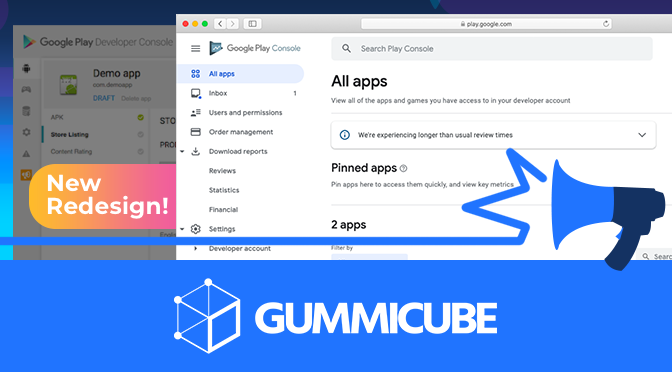
App Store Holiday Schedule 2020
Posted on November 23rd, 2020
When is the App Store Holiday Schedule 2020? Learn about the dates of this year's shutdown and how to prepare.

Google frequently updates its Play Store with both user-facing and developer-facing changes. The latest round of updates is a Material Theme redesign, which can impact how apps appear on the Play Store, but Google has also announced updates to Android APIs and Play policies that developers should be aware of. These changes can have an impact on their App Store Optimization and Play Store listings.
The first update primarily impacts how apps are displayed on the Play Store. Google Play Store version 14.5.52 adds a bottom bar with tabs for Home, Games, Movies & TV and Books sections, with hollow icons that light up when selected.
The homepage has also removed nested tabs and icons for categories. Category ranking has been steadily losing importance for app discovery, as search continues to provide 70% of app downloads, so the category tabs being removed reflects this.
It is also important to note that the redesigned Google Play icons are now being enforced on the Play Store. Apps should have redesigned their icons according to the new style, as those that have not will be displayed in a “legacy mode” that places their circular icon inside a rounded box as of June 24th. An app’s icon is the first thing a user sees before clicking on the app, making them play a vital role in click-through-rates. According to Adobe, optimizing creatives like an icon can help increase CTR by up to 71%, so featuring an icon not updated and designed for the Play Store can have a negative impact on the app’s success.
In October 2018, Google announced that Android apps could no longer use SMS and Call Log permissions unless it was a “core functionality” of the app. According to Google, as a result of the policy change, “the number of apps with access to this sensitive information has decreased by more than 98%. The vast majority of these were able to switch to an alternative or eliminate minor functionality.”
Following developer feedback, Google has adjusted its policy. Developers expressed frustration at the decision making process, stating that the permission declaration forms were unclear. Others felt that it took too long to get answers on whether or not their apps met policy requirements or to appeal a decision. Reaching human agents proved a troublesome process, and several developers expressed frustration at what they felt were automated replies. As such, Google announced changes that would address these concerns.
First and foremost, Google will provide developers with more information and details regarding their rejections and appeals. This includes not only why the decision was made, but what apps can do to adjust to be compliant and how they can appeal. The appeal process itself will be reviewed and improved, with an expanded team of Google employees handling it.
Similarly, developers whose accounts have been blocked from distributing apps can appeal the decision. There are often developer accounts that are suspended for “serious, repeated violation of policies that protect [Google’s] shared users.” The number of fraudulent apps has increased by 159% from 2017 to 2018, while Google rejected or suspended 66% more developers in that same time frame.
Developers of those apps, when caught, may try to create new accounts or using other existing accounts to publish unsafe apps. It is rare, but not unheard of, for a developer to be erroneously connected to a malicious app. In these situations, developers can appeal the decision, and potentially have their accounts restored if a decision was made in error.
In order to combat malicious apps while ensuring new developers are trustworthy, Google will take more time to review apps by developers that do not yet have a proven history. This allows for more thorough checks before approving an app, but it may delay an app’s launch by a matter of days.
New developers should keep this change in mind when launching their app. If they do not yet have a track record with Google Play, they should submit their app up to a week in advance to ensure there is enough time for Android’s more thorough approval process.
Every change to the Google Play Store and Google’s developer policies can have a far-reaching impact on app developers and their App Store Optimization. Redesigns can impact how apps appear and are viewed on the store, so it’s necessary to keep up with upcoming changes and adjust accordingly. Developers who were prepared for the new icon changes optimized icons their for the store redesign, while those that were not may see a drop in their CTR as users aren’t drawn to their legacy mode icons.
Developers will want to ensure that their apps follow Google’s guidelines for permissions, but the extra feedback and appeals will allow them to adjust their apps or state their case with better insight and efficiency. This will reduce an app’s time spent removed from the store and working through rejections, so they can resume reaching users more quickly.
Whenever there’s a change, it’s important to understand the impact it will have on ASO and prepare accordingly. Those that know about upcoming changes have time to prepare for them and can ride the wave of progress to future success, while those who are unprepared must scramble to adjust their apps or drown.

When is the App Store Holiday Schedule 2020? Learn about the dates of this year's shutdown and how to prepare.

Apple's App Store Guidelines have strict privacy requirements. Developers now must provide information to users on the App Store listing regarding the data they access.

The Google Play Developer Console has been updated with a new design and adjusted tools. What's different, and how will it impact App Store Optimization?